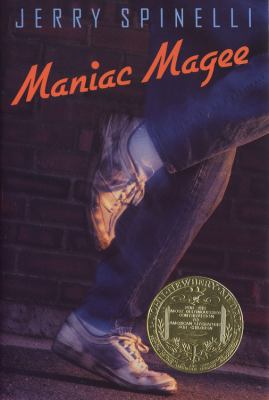
by Jerry Spinelli
Publishers Weekly
: In this modern-day tall tale, Spinelli ( Dump Days ; Jason and Marceline ) presents a humorous yet poignant look at the issue of race relations, a rare topic for a work aimed at middle readers. Orphaned as an infant, Jerry Magee is reared by his feuding aunt and uncle until he runs away at age eight. He finds his way to Two Mills, Pa., where the legend of ``Maniac'' Magee begins after he scores major upsets against Brian Denehy, the star high school football player, and Little League tough guy, John McNab. In racially divided Two Mills, the Beales, a black family, take Maniac in, but despite his local fame, community pressure forces him out and he returns to living at the zoo. Park groundskeeper Grayson next cares for the boy, but the old man dies and Maniac moves into the squalid home of the McNabs, who are convinced a race war is imminent. After a showdown with his nemesis, Mars Bar, Maniac bridges the gap between the two sides of town and finally finds a home. Full of snappy street-talk cadences, this off-the-wall yarn will give readers of all colors plenty of food for thought. Ages 8-12. Copyright 1990 Cahners Business Information, Inc. Distributed by Syndetic Solutions Inc. Terms
School Library Journal
: Gr 6-10-- Warning: this interesting book is a mythical story about racism. It should not be read as reality. Legend springs up about Jeffrey ``Maniac'' Magee, a white boy who runs faster and hits balls farther than anyone, who lives on his own with amazing grace, and is innocent as to racial affairs. After running away from a loveless home, he encounters several families, in and around Two Mills, a town sharply divided into the black East End and the white West End. Black, feisty Amanda Beale and her family lovingly open their home to Maniac, and tough, smart-talking ``Mars Bar'' Thompson and other characters are all, to varying degrees, full of prejudices and unaware of their own racism. Racial epithets are sprinkled throught the book; Mars Bar calls Maniac ``fishbelly,'' and blacks are described by a white character as being ``today's Indians.'' In the final, disjointed section of the book, Maniac confronts the hatred that perpetuates ignorance by bringing Mars Bar to meet the Pickwells--``the best the West End had to offer.'' In the feel-good ending, Mars and Maniac resolve their differences; Maniac gets a home and there is hope for at least improved racial relations. Unreal? Yes. It's a cop-out for Spinelli to have framed this story as a legend--it frees him from having to make it real, or even possible. Nevertheless, the book will stimulate thinking about racism, and it might help educate those readers who, like so many students, have no first-hand knowledge of people of other races. Pathos and compassion inform a short, relatively easy-to-read story with broad appeal, which suggests that to solve problems of racism, people must first know each other as individuals. --Joel Shoemaker, Tilford Middle School, Vinton, IA Copyright 1990 Cahners Business Information, Inc. Distributed by Syndetic Solutions Inc. Terms
|